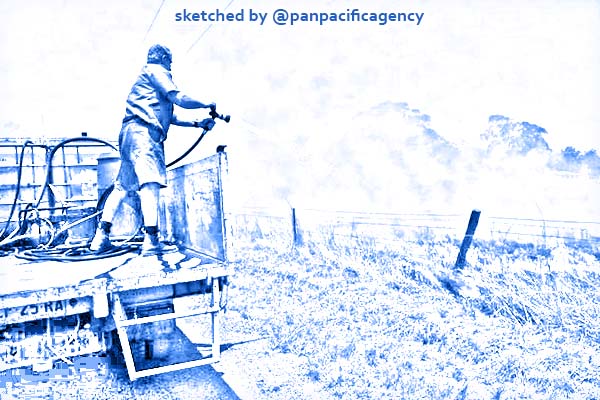[Analytics] One word that defines the bushfire crisis in Australia

A Tinonee resident helps to fight spot and grass fires in the Hillville area near Taree, New South Wales, on Nov 13, 2019.PHOTO: EPA-EFE. Sketched by the Pan Pacific Agency.
“When the facts change, I change my mind.” John Maynard Keynes may have been talking about the economy, all those years ago, but his words also ring true right now, about the bushfires engulfing vast sections of our country. Murray Watt specially for the News.com.au.
The word most used to describe this year’s bushfires is “unprecedented”. Unprecedented in breadth, in intensity, and in their timing – starting earlier and going longer than anything we have seen before.
Summer has not even started, yet bushfires have already destroyed over a million hectares across every state in the country, leaving homes, farms, livestock and, tragically, human life in their wake.
For weeks, Australians have been waiting for our Prime Minister to show that he gets it. That things are changing, and that newer, bigger threats from natural disasters require a newer, bigger response.
Instead, Scott Morrison plays the same record, saying his current policies are working fine.
Just as he has no plan to get wages and our economy moving, it seems he has no plan for dealing with the havoc our changing climate is predicted to wreak.
I get that we haven’t reached agreement on what to do about emissions. But I haven’t met one firefighter, volunteer or community leader in bushfire-affected areas, who thinks we don’t need to prepare for a different kind of future.
Indeed, a new survey shows that most Australians agree, saying the government isn’t doing enough to prepare for the bushfires of the future.
That’s no surprise – isn’t it just common sense to limit the damage, to save Australians’ lives and properties, from future disasters? Even the government’s own science adviser, CSIRO, says that climate change will cause “an increase in the number of high fire weather danger days and a longer fire season for southern and eastern Australia”.
And that’s before we get to the increasing number and intensity of cyclones and floods we are likely to face in other parts of the country.
To ignore this – to not prepare Australia for future disasters – is gross negligence on our government’s part. It is failing the most basic duty of any government – to protect Australians from risk.
Sadly, rather than having a Prime Minister willing to ensure Australia is disaster-ready, we have one who won’t even meet with ex-fire chiefs – with decades of experience, saving lives and fighting fires – who just want to help.
The truth is, Scott Morrison can’t come up with a plan. Because having a plan to prepare for climate-induced disasters means accepting that climate change is real. And this is stuck in the ideological quicksand of the Coalition party room.
Our climate is changing. Scientists tell us, ex-fire chiefs tell us, farmers and rural firefighters tell us. Just once, can our Prime Minister put aside the politics and come up with a plan to protect our fellow Australians?
Federal Labor has offered bipartisan support, suggesting an urgent COAG meeting of Federal, State and Territory, and local government leaders, to improve the nation’s preparedness for natural disasters.
This is the best way to ensure all ideas – mitigation projects, more water bombing aircraft, developing a bigger volunteer workforce – are aired, in a cooperative spirit, that puts the nation first.
Sadly, the Government has again dismissed this suggestion, saying “everyone just needs to calm down”.
A bit of a plan from our government might help with that.
To paraphrase Keynes, the facts have changed. It’s time Scott Morrison changed his mind.
Murray Watt is a Labor Senator representing Queensland. He is the Shadow Minister for Natural Disaster and Emergency Management, and for Northern Australia.